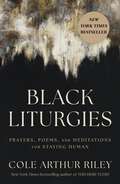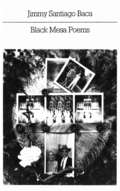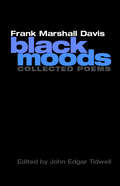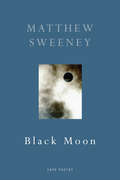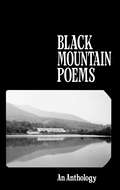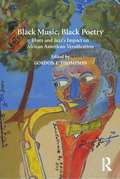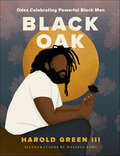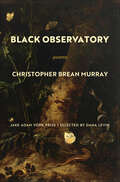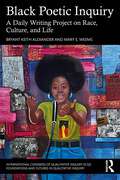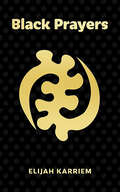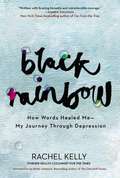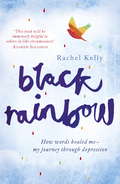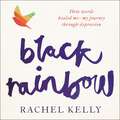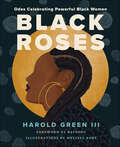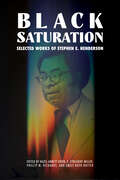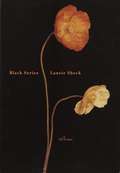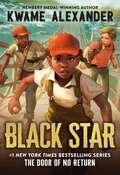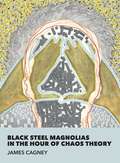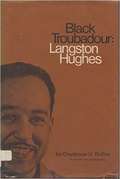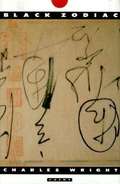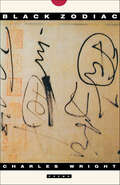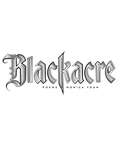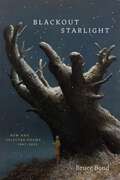- Table View
- List View
Black Liturgies: Prayers, poems and meditations for staying human
by Cole Arthur RileyIn the summer of 2020, Cole Arthur Riley was desperate for a spirituality she could trust. Amidst ongoing national racial violence, the isolation of the pandemic, and a surge of anti-Black rhetoric in many Christian spaces, she began dreaming of a harbour for a more human, more liberating expression of faith. She went on to create Black Liturgies, a digital project that connects spiritual practice with Black emotion, memory, and the Black body.In this book, she deepens the work of that project, bringing together new prayers, letters, poetry, meditation questions, breath practice, and the writings of Black literary ancestors to offer 43 liturgies that can be practised individually or as a community. With a poet's touch and a sensitivity that has made her one of the most important spiritual voices at work today, Riley invites readers to reflect on their own experiences of wonder, rest, rage, and repair, while also including liturgies for holidays like Lent, Advent and Mother's Day.For those healing from spiritual spaces that were more violent than loving; for those who have escaped the trauma of white Christian nationalism, religious homophobia, and transphobia; for anyone asking what it means to be human in a world of both beauty and terror; Black Liturgies is a work of healing and liberation, and a vision for what might be.
Black Maria: Being the Adventures of Delilah Redbone & A.K.A. Jones
by Kevin YoungKevin Young follows his acclaimed exploration of the blues in Jelly Roll with another playful riff on a vital art form, giving us a film noir in verse. Black Maria–the title is a slang term for a police van as well as a hearse–is a twisting tale of suspicion, passion, mystery, and the city. Young channels the world of detective movies, picking up its lingo and dark glamour in five “reels” of poetry–the adventures of a “soft-boiled” private eye, known as A.K.A. Jones, and an ingenue turned femme fatale, Delilah Redbone, who’s come to town from down south (“Mama bent till dark/tending rows to send/Me to school... I wanted/ To head on & hitch... strike it/Big”). We follow Jones and Delilah through a maze of aliases and ambushes, sex and suspicions, fast talk and hard luck, in Shadowtown where noir characters abound. The Killer, The Gunsel, The Hack, The Director, The Champ, and The Snitch are among the local luminaries and beautiful losers who mingle with Jones and his elusive lady as they stalk one another through the scenes of the poet’s dazzling “treatment.” Charming, funky, bleak, humorous, picaresque, and full of pathos, Black Maria is brimming with the originality and stark lyricism we have come to expect from this remarkable poet.
Black Mesa Poems
by Jimmy Santiago BacaBlack Mesa Poems is rooted in the American Southwest, the setting of Jimmy Santiago Baca's highly acclaimed long narrative poem, Martin & Meditations on the South Valley (New Directions, 1987). Black Mesa Poems is rooted in the American Southwest, the setting of Jimmy Santiago Baca's highly acclaimed long narrative poem, Martin & Meditations on the South Valley (New Directions, 1987). "Baca's evocation of this landscape," as City Paper noted, "its aridity and fertility, is nothing short of brilliant." The individual poems of Black Mesa are embedded both in the family and in the community life of the barrio, detailing births and deaths, neighbors and seasons, injustices and victories. Loosely interconnected, the poems trace a visionary biography of place.
Black Moods: Collected Poems (American Poetry Recovery Series)
by Frank Marshall DavisBlack Moods collects for the first time all of Frank Marshall Davis’s extant published poems as well as his previously unpublished work. From sharp-edged sketches of Southside Chicago’s urban landscape to the prismatic world that lay beneath Hawaii’s placid surface, Davis’s muscular poems blend social, cultural, and political concerns--always shaped by his promise to “try to be as direct as good blues.” John Edgar Tidwell’s introduction examines both Davis’s poetry and his politics, presenting a subtle portrait of a complex writer devoted to exposing discriminatory practices and reaffirming the humanity of the common people.
Black Moon
by Matthew SweeneyNegotiating the borders and hinterlands of Central and Eastern Europe - with occasional coracle trips or forays to Antarctica for a round of golf - the homesick flaneur surveys the surrounding devastation with the same mixture of fascination and alarm he feels when he discovers the sweat-mark on his T-shirt makes a perfect map of Ireland. All around, he sees natural and man-made catastrophe: the ruins and remnants of war peopled by kidnappers and assassins, feral dogs, death squads, the dispossessed and deracinated. These poems are parables of threat, parties for the end of the world; they speak eloquently of damage, displacement and the resulting swell of terror: 'I looked back at the door heard the lock click, then beyondanother lock, then another.'
Black Mountain Poems: Poems And Essays (American Literature Ser.)
by Jonathan C. CreasyAn essential selection of one of the most important twentieth-century creative movements Black Mountain College had an explosive influence on American poetry, music, art, craft, dance, and thought; it’s hard to imagine any other institution that was so utopian, rebellious, and experimental. Founded with the mission of creating rounded, complete people by balancing the arts and manual labor within a democratic, nonhierarchical structure, Black Mountain was a crucible of revolutionary literature. Although this artistic haven only existed from 1933 to 1956, Black Mountain helped inspire some of the most radical and significant midcentury American poets. This anthology begins with the well-known Black Mountain Poets—Charles Olson, Robert Creeley, Robert Duncan, and Denise Levertov—but also includes the artist Josef Albers and the musician John Cage, as well as the often overlooked women associated with the college, M. C. Richards and Hilda Morley.
Black Music, Black Poetry: Blues and Jazz's Impact on African American Versification
by Gordon E. ThompsonBlack Music, Black Poetry offers readers a fuller appreciation of the diversity of approaches to reading black American poetry. It does so by linking a diverse body of poetry to musical genres that range from the spirituals to contemporary jazz. The poetry of familiar figures such as Paul Laurence Dunbar and Langston Hughes and less well-known poets like Harryette Mullen or the lyricist to Pharaoh Sanders, Amos Leon Thomas, is scrutinized in relation to a musical tradition contemporaneous with the lifetime of each poet. Black music is considered the strongest representation of black American communal consciousness; and black poetry, by drawing upon such a musical legacy, lays claim to a powerful and enduring black aesthetic. The contributors to this volume take on issues of black cultural authenticity, of musical imitation, and of poetic performance as displayed in the work of Paul Laurence Dunbar, Langston Hughes, Sterling Brown, Amiri Baraka, Michael Harper, Nathaniel Mackey, Jayne Cortez, Harryette Mullen, and Amos Leon Thomas. Taken together, these essays offer a rich examination of the breath of black poetry and the ties it has to the rhythms and forms of black music and the influence of black music on black poetic practice.
Black Oak: Odes Celebrating Powerful Black Men
by Harold GreenAs he did for Black women in Black Roses, Harold Green III, poet and founder of the music collective Flowers for the Living, now honors the Black men he most admires—groundbreakers including Tyler Perry, Barry Jenkins, Billy Porter, Chance the Rapper, LeBron James, Colin Kaepernick, and John Legend—and celebrates their achievements which are transforming lives and making history.Black men are changing society and the world through mastery, innovation, and inspiration at a pace never seen before. In awe of the myriad ways in which Black men are using their vision and power to remake culture and society, spoken word artist Harold Green began writing odes recognizing the extraordinary accomplishments of a series of Black men, which heshared on his Instagram account—tributes that went viral and became a social media sensation. Black Oak brings together many of these popular odes with original works written for this collection.Divided into five sections—bravehearts, champions, dreamers, guardians, and humanitarians—Black Oak features iconic men who are spearheading movements, fighting for equality, challenging the status quo, embracing fatherhood, providing a transformative model of masculinity for our children, inspiring a new generation of creators, and more. Through these beautifully written verses, Harold does not simply place the Black men in this book on a pedestal, he transcends even the most positive stereotypes to view these men and their accomplishments in a new light, and creates meaningful connections between these beloved figures and the lives and experiences of readers of all backgrounds. Featuring full-color illustrations by Melissa Koby, Black Oak includes odes to Barry Jenkins, Big K.R.I.T, Billy Porter, Black Thought, Chance the Rapper, Charles Booker, Colin Kaepernick, Dwyane Wade, Edmund Graham III, Eric Hale, Excell Hardy Jr., Harold Green III, Harold Green Jr., Harold Green Sr., Hebru Brantley, Henry Louis Gates Jr., Jamaal Bowman, Jason Reynolds, Jericho Brown, John Legend, Kehinde Wiley, Kerry James Marshall, Kevin Fredricks, Killer Mike, Kyler Broadus, LeBron James, Mahershala Ali, Marc Lamont Hill, Matthew Cherry, Orlando Cooper, Pharrell, Rev. Dr. Otis Moss III, Rev. Dr. William Barber II, Ryan Coogler, Swizz Beatz, Ta-Nehisi Coates, Theaster Gates, Tobe Nwigwe, Tristan Walker, and Tyler Perry.
Black Observatory: Poems
by Christopher Brean MurrayTelescopes aim to observe the light of the cosmos, but Christopher Brean Murray turns his powerful lens toward the strange darkness of human existence in Black Observatory, selected by Dana Levin as winner of the Jake Adam York Prize. With speakers set adrift in mysterious settings—a motel in the middle of a white-sand desert, a house haunted by the ghost of a dead writer, an abandoned settlement high in the mountains, a city that might give way to riotous forest—Black Observatory upends the world we think we know. Here, an accident with a squirrel proves the least bizarre moment of a day that is ordinary in outline only. The future is revealed in a list of odd crimes-to-be. And in a field of grasses, a narrator loses himself in a past and present “human conflagration / of desire and doubt,” the “path to a field of unraveling.”Unraveling lies at the heart of these poems. Murray picks at the frayed edges of everyday life, spinning new threads and weaving an uncanny and at times unnerving tapestry in its place. He arranges and rearranges images until the mundane becomes distorted: a cloud “stretches and coils and becomes an intestine / embracing the anxious protagonist,” thoughts “leap from sagebrush / like jackrabbits into your high beams,” a hot black coffee tastes “like runoff from a glacier.” In the process, our world emerges in surprising, disquieting relief.Simultaneously comic and tragic, playful and deeply serious, Black Observatory is a singular debut collection, a portrait of reality in penumbra.
Black Poetic Inquiry: A Daily Writing Project on Race, Culture, and Life (International Congress of Qualitative Inquiry (ICQI) Foundations and Futures in Qualitative Inquiry)
by Bryant Keith Alexander Mary E. WeemsThe poems in this project were written within a 24‑hour period of each other and are presented in order of their appearance for the month of January 2024.Written as a call and response to each other, the poems are at times direct responses in content and form, or a mediation on what the offering triggered in the other. Using poetry writing as a methodological engagement with the reflective and reflexive attributes of autoethnography, this project offers an examination of lived experience and will provide a critical expansion of poetic inquiry. An example of "collaborative spirit‑writing," this text uses a dialogical exchange of responsiveness, excavating the lived experiences of the two authors (a Black man and a Black woman) with complex intersectional identities. Using poetic writing as both form and function, this book provides a performance of remembrance and resistance.Students and researchers working with qualitative inquiry and in areas from performative writing to Critical Race Studies will find this book a useful addition to their research. Teachers will also find this book facilitates pedagogies of engagement.
Black Prayers
by Elijah Karriem‘My original thought when writing this book was as a paean to the church – the Black Church – that had sustained me throughout my childhood and boyhood. I wanted to say thank you for all the joy, strength, hope and faith it had given me. ‘I also wanted to celebrate the wider voices of the black diaspora that have added an essence of wisdom to my youth and adulthood: I would not be the person I am today without these voices and influences. ‘I have learned that silence is blessing if you seek the truth, but there comes a time to sing of the truths – so I have now chosen to sing. ‘God works and is manifest through the flesh of people. If we listen to the God Voice within, we can hear the genetically coded source of holy science throughout our brief sojourn on this planet. Read, enjoy, and if it is your wont – get annoyed! ‘All I desire is that these poems move you.’ Elijah Karriem
Black Rainbow: How Words Healed Me, My Journey Through Depression
by Rachel KellyIn 1997, Oxford graduate, working mother and Times journalist Rachel Kelly went from feeling mildly anxious to being completely unable to function within the space of just three days. Prescribed antidepressants by her doctor, and supported by her husband and her family, Rachel slowly began to get better, but her anxiety levels remained high, and six years later, as a stay-at-home mother, she suffered a second collapse even worse than the first. Throughout both of Rachel's periods of severe depression, the healing power of poetry became an integral part of her recovery. As someone who had always loved poetry, it became something for Rachel to cling on to in times of need - from repeating short mantras to learning and reciting entire poems - these words and verses became a powerful force for change in her life. In Black Rainbow Rachel analyses why poetry can be one answer to depression, and the book contains a selected 40 of the poems that provided Rachel with solace and comfort during her breakdown and recovery. At a time when mental health problems and depression are becoming more common, and the stigma around such issues is finally being lifted, this book offers a lifeline for anyone seeking to understand depression and seek new ways to treat it. Poetry is free, has no side-effects and, as Rachel can attest, 'prescribing words instead of pills' can be an incredibly powerful remedy.
Black Rainbow: How words healed me: my journey through depression
by Rachel KellyBlack Rainbow is the powerful first-person story of one woman's struggle with depression and how she managed to recover from it through the power of poetry.In 1997, Oxford graduate, working mother and Times journalist Rachel Kelly went from feeling mildly anxious to being completely unable to function within the space of just three days. Prescribed antidepressants by her doctor, and supported by her husband and her family, Rachel slowly began to get better, but her anxiety levels remained high, and six years later, as a stay-at-home mother, she suffered a second collapse even worse than the first.Throughout both of Rachel's periods of severe depression, the healing power of poetry became an integral part of her recovery. As someone who had always loved poetry, it became something for Rachel to cling on to in times of need - from repeating short mantras to learning and reciting entire poems - these words and verses became a powerful force for change in her life. In Black Rainbow Rachel analyses why poetry can be one answer to depression, and the book contains a selected 40 of the poems that provided Rachel with solace and comfort during her breakdown and recovery. At a time when mental health problems and depression are becoming more common, and the stigma around such issues is finally being lifted, this book offers a lifeline for anyone seeking to understand depression and seek new ways to treat it. Poetry is free, has no side-effects and, as Rachel can attest, 'prescribing words instead of pills' can be an incredibly powerful remedy.
Black Rainbow: How words healed me: my journey through depression
by Rachel KellyBlack Rainbow is the powerful first-person story of one woman's struggle with depression and how she managed to recover from it through the power of poetry.In 1997, Oxford graduate, working mother and Times journalist Rachel Kelly went from feeling mildly anxious to being completely unable to function within the space of just three days. Prescribed antidepressants by her doctor, and supported by her husband and her family, Rachel slowly began to get better, but her anxiety levels remained high, and six years later, as a stay-at-home mother, she suffered a second collapse even worse than the first.Throughout both of Rachel's periods of severe depression, the healing power of poetry became an integral part of her recovery. As someone who had always loved poetry, it became something for Rachel to cling on to in times of need - from repeating short mantras to learning and reciting entire poems - these words and verses became a powerful force for change in her life. In Black Rainbow Rachel analyses why poetry can be one answer to depression, and the book contains a selected 40 of the poems that provided Rachel with solace and comfort during her breakdown and recovery. At a time when mental health problems and depression are becoming more common, and the stigma around such issues is finally being lifted, this book offers a lifeline for anyone seeking to understand depression and seek new ways to treat it. Poetry is free, has no side-effects and, as Rachel can attest, 'prescribing words instead of pills' can be an incredibly powerful remedy.
Black Rainbow: How words healed me: my journey through depression
by Rachel KellyBlack Rainbow is the powerful first-person story of one woman's struggle with depression and how she managed to recover from it through the power of poetry.In 1997, Oxford graduate, working mother and Times journalist Rachel Kelly went from feeling mildly anxious to being completely unable to function within the space of just three days. Prescribed antidepressants by her doctor, and supported by her husband and her family, Rachel slowly began to get better, but her anxiety levels remained high, and six years later, as a stay-at-home mother, she suffered a second collapse even worse than the first.Throughout both of Rachel's periods of severe depression, the healing power of poetry became an integral part of her recovery. As someone who had always loved poetry, it became something for Rachel to cling on to in times of need - from repeating short mantras to learning and reciting entire poems - these words and verses became a powerful force for change in her life. In Black Rainbow Rachel analyses why poetry can be one answer to depression, and the book contains a selected 40 of the poems that provided Rachel with solace and comfort during her breakdown and recovery. At a time when mental health problems and depression are becoming more common, and the stigma around such issues is finally being lifted, this book offers a lifeline for anyone seeking to understand depression and seek new ways to treat it. Poetry is free, has no side-effects and, as Rachel can attest, 'prescribing words instead of pills' can be an incredibly powerful remedy.(P)2014 Hodder & Stoughton
Black Roses: Odes Celebrating Powerful Black Women
by Harold GreenThe poet and founder of the music collective Flowers for the Living pays tribute to all Black women by focusing on visionaries and leaders who are making history right now, including Ava DuVernay, Janelle Monae, Kamala Harris, Misty Copeland, Nikole Hannah-Jones, Robin Roberts, Roxane Gay, and Simone Biles—with this compilation of celebratory odes featuring full-color illustrations by Melissa Koby.Black women are exceptional. To honor how Black women use their minds, talent, passion, and power to transform society, Harold Green began writing love letters in verse which he shared on his Instagram account. Balm for our troubled times, his tributes to visionaries and leaders quickly went viral and became a social media sensation. Now, in this remarkable collection, Green brings together many of these popular odes with never-before-seen works. A timely celebration of contemporary Black figures who are making history and shaping our culture today, Black Roses is divided into five sections—advocates, curators, innovators, luminaries, trailblazers—reflecting the diversity of Black women’s achievements and the depth of their reach. These inspiring changemakers are leaving their mark on the world by creating new beauty in their respective art forms, heading movements, fighting for equality and to change the status quo, and championing new definitions of what’s possible in every meaningful way. Green lifts them up to create meaningful connections between these figures and our own lives and experiences.Black Roses spotlights and urges readers to learn more about Allyson Felix, Angelica Ross, Ava DuVernay, Bisa Butler, Bozoma Saint John, Charisma Sweat-Green, Dr. Eve Ewing, Dr. Janice Jackson, Dr. Johnnetta Cole, Eunique Jones-Gibson, Issa Rae, Janelle Monae, Jennifer Hudson, Jessica Matthews, Kamala Harris, Keisha Bottoms, Kimberly Bryant, Kimberly Drew, Lisa Green, Lizzo, Mandilyn Graham, Mellody Hobson, Michelle Alexander, Misty Copeland, Naomi Beckwith, Nikole Hannah-Jones, Phylicia Rashad, Rapsody, Raquel Willis, Robin Roberts, Roxane Gay, Shellye Archambeau, Simone Biles, Stacey Abrams, Tabitha Brown, Tamika Mallory, Tarana Burke, Tasha Bell, Tomi Adeyemi, and Tracee Ellis Ross.
Black Saturation: Selected Works of Stephen E. Henderson (Margaret Walker Alexander Series in African American Studies)
by E. Ethelbert Miller Emily Ruth Rutter Hazel Arnett Ervin Phillip M. RichardsCommitted to developing frameworks for defining and evaluating Black poetry, literary scholar Stephen E. Henderson (1925–1997) examined the question: What makes a poem Black? In his critical approach, Henderson prioritized form but not at the expense of source, function, or context, and, in so doing, developed convincing theoretical frameworks for examining African American lyric expressions, especially that of Black Arts poets. Black Saturation: Selected Works of Stephen E. Henderson is designed to expand and enrich understandings of Henderson’s critical corpus by showcasing many of his most essential essays, presentations, and syllabi in a standalone volume. Henderson deftly conceptualized the ways in which aesthetic innovations were interwoven with revolutionary exigencies—a marriage of poetry and politics that became a hallmark of the 1960s and ’70s. While other critics often ignored or fumbled to construct an adequate rubric for evaluating and celebrating Black Arts poetry—penned by Amiri Baraka, Carolyn Rodgers, Sonia Sanchez, Jayne Cortez, Mari Evans, Sarah Webster Fabio, Haki Madhubuti, and Larry Neal, among many others—Henderson constellated a triad of interdependent characteristics (structure, theme, and saturation) through which he examined Black literature in general and poetry in particular. Revisiting Henderson’s scholarship in the third decade of the twenty-first century allows us, on the one hand, to further appreciate his imprint on current scholarship about Black literature, especially poetry, and, on the other, to introduce contemporary students and scholars to his salient theoretical frameworks, not to mention his persuasive critical style.
Black Series: Poems
by Laurie SheckIn her remarkable Black Series, Laurie Sheck turns the ordinary world inside out and shows us its glittering seams. Her long, elegantly quizzical lines convey a haunted vision of human striving which is in part an elaboration on our daily reality, and in part a fantastic departure from it. "I can almost taste the glassy air," she writes. "Where are the birds in it, / wings lifting as currents buffet them like echoes, bright / chaos of atomized instances . . . ?" Roaming freely in the shifting landscape of the imagination, Sheck delivers an inner life that is just as vivid as what we see around us; at the same time, she shows us what we see in a new light, bringing illumination even to darkness:It's the black night that wakes in me, so dominant, so focused.And then a car goes by and I think, "I'm in the world,"tires kicking up gravel from the dust.What does the orange hawkweed do inside this dark-its radiancesecretive but not extinguished?To read this collection is to discover at every turn that secretive but undeniable radiance, and a language that is both riveting and distinctive.From the Hardcover edition.
Black Star (The Door of No Return series #2)
by Kwame AlexanderThe riveting second book in the #1 New York Times bestselling Door of No Return trilogy stars Kofi&’s granddaughter, Charley, who&’s set on becoming the first female pitcher to play professional ball but who soon has to contend with the tensions about to boil over in her segregated town.You can&’t protect her from knowing. The truth is all we have. 12-year old Charley Cuffey is many things: a granddaughter, a best friend, and probably the best pitcher in all of Lee&’s Mill. Set on becoming the first female pitcher to play professional ball, Charley doesn't need reminders from her best friend Cool Willie Green to know that she has lofty dreams for a Black girl in the American South. Even so, Nana Kofi's thrilling stories about courageous ancestors and epic journeys make it impossible not to dream big. She knows he has so many more to tell, but according to her parents, she isn't old enough to know about certain things like what happened to Booker Preston that one night in Great Bridge and why she can never play on the brand-new real deal baseball field on the other side of town. When Charley challenges a neighborhood bully to a game at the church picnic, she knows she can win, even with her ragtag team. But when the picnic spills over onto their ball field, she makes a fateful decision. A child cannot protect herself if she does not know her history, and Charley's choice brings consequences she never could have imagined. In this thrilling second book of the Door of No Return trilogy, set during the turbulent segregation era, and the beginning of The Great Migration, Kwame Alexander weaves a spellbinding story of struggle, determination, and the unflappable faith of an American family.
Black Steel Magnolias In The Hour Of Chaos Theory
by James CagneyPoetry. African & African American Studies. California Interest. <P><P>The poems in BLACK STEEL MAGNOLIAS IN THE HOUR OF CHAOS THEORY interrogate identity, family, loneliness, and the expectations of masculinity. Using dreams, blues, and a chorus of voices, this collection of poems examines the complexities of intimacy for an adopted person trying to find balance between two families--one rattled by age and illness; the other, holding space for a son that doesn't exist.
Black Troubadour Langston Hughes
by Charlemae H. RollinsLangston Hughes was an American poet, social activist, novelist, playwright, and columnist. He was one of the earliest innovators of the then-new literary art form jazz poetry. Hughes is best known as a leader of the Harlem Renaissance.<P><P>Winner of the Coretta Scott King Medal
Black Zodiac
by Charles WrightThese are poems suffused with spiritual longing, lyrical meditations on faith, religion, heritage, and morality that also explore aging and mortality with restless grace. Entering by way of small moments, Wright magnifies details to reveal a truth much larger than the quotidian happening that engendered it. <P><P> Pulitzer Prize Winner
Black Zodiac: Poems
by Charles WrightWinner of the Pulitzer Prize and the National Book Critics Circle AwardBlack Zodiac offers poems suffused with spiritual longing—lyrical meditations on faith, religion, heritage, and morality. The poems also explore aging and mortality with restless grace. Approaching his vast subjects by way of small moments, Wright magnifies details to reveal truths much larger than the quotidian happenings that engendered them. His is an astonishing, flexible, domestic-yet-universal verse. As the critic Helen Vendler has observed, Wright is a poet who "sounds like nobody else."
Blackacre: Poems
by Monica Youn*Winner of the William Carlos Williams Award**National Book Critics Circle Award Finalist**Included in The New York Times Best Poetry of 2016**Named one of The Washington Post's Best Poetry Collections of 2016** Longlisted for the National Book Award*“Blackacre” is a centuries-old legal fiction—a placeholder name for a hypothetical estate. Treacherously lush or alluringly bleak, these poems reframe their subjects as landscape, as legacy—a bereavement, an intimacy, a racial identity, a pubescence, a culpability, a diagnosis. With a surveyor’s keenest tools, Youn marks the boundaries of the given, what we have been allotted: acreage that has been ruthlessly fenced, previously tenanted, ploughed and harvested, enriched and depleted. In the title sequence, the poet gleans a second crop from the field of Milton’s great sonnet on his blindness: a lyric meditation on her barrenness, on her own desire—her own struggle—to conceive a child. What happens when the transformative imagination comes up against the limits of unalterable fact?
Blackout Starlight: New and Selected Poems, 1997-2015
by Bruce BondBlackout Starlight brings together a selection of poems from nine previously published books, along with a generous assortment of new work. At the heart of this collection are investigations of the role of eros, language, and creative life, and of the wonder and anxiety of their absence. In Bond’s telling, the lines between real and unreal, living and dead, blur together in the poet’s imagination, casting an equally compassionate eye upon “the man we see writhing in the marble” of an uncarved statue and the son at a funeral trying to face “the other half of life, the part / without my father in it.”Taken together, the selections in this book represent the highlights of a dazzling career in poetry and leave the reader eager for many more years of Bond’s verses to come.
